CAA News Today
Announcement: CAA’s 110th Annual Conference Pivots to Virtual
posted by CAA — Jan 07, 2022
Meme Omogbai, CAA’s Executive Director and CEO, and Laura Anderson Barbata, Vice President for Annual Conference and Programs discuss the pivot to a virtual conference.
Dear CAA members,
First and foremost, we want to wish you a happy New Year and hope that you found a way to celebrate with loved ones during this challenging period of the pandemic. It’s essential that we continue to honor traditions, express gratitude, and maintain connections that are important to us.
As we continue to prepare for our Annual Conference beginning in February, the health and safety of our members is our primary concern. We prioritize member feedback and continue to be responsive to your needs and preferences in a way that is scalable. This past year, many of you expressed the desire for an in-person gathering in 2022, complemented by virtual components increasing accessibility. We have worked diligently to provide an experience that meets your expectations.
Focusing on meeting our commitment to members, based upon quantitative and qualitative analysis, surveys, and other feedback consistent with the fundamentals of our strategic repositioning, we have been closely monitoring the COVID pandemic and the rapidly developing Omicron strain as well as CDC guidelines. Given this information and the recent feedback we’ve received from you regarding concerns about convening in person, the travel advisory issued by the Chicago Department of Public Health (CDPH) this week, and the uncertainty of the weeks and months ahead, we have decided to make the CAA 2022 Annual Conference entirely virtual. All in-person sessions and activities scheduled for February 16–19 in Chicago will now become virtual on the same dates. Virtual sessions and activities scheduled for March 3–5 will remain the same. All recordings will also remain available through April 14 as previously planned and communicated.
Our history, as described in CAA’s centennial publication, The Eye, the Hand, the Mind, has shown that we can change and adapt. The pandemic has once again shown us how nimble we can be as we pivot for the future. CAA staff will work in the coming days to seamlessly shift programming to an all-virtual format.
If you have already registered for the conference at any paid level—all-access, presenter, or virtual-only—your registration will automatically be converted to all-access for all sessions at the current virtual rate. Current all-access registrants may also choose to be credited or refunded for the difference between the prior all-access and current virtual rates. Alternatively, we would greatly appreciate your considering donating this amount to CAA to help offset the costs related to this change. Those currently registered for all-access will receive an email in the coming days with a form to select their credit, donation, or refund preference.
We continue to be committed to fulfilling your expectations and to providing a conference that suits your means of engagement, provides a wealth of scholarly content, and allows multiple ways to connect with others. In contrast with last year’s conference, all presentations during the 2022 conference will be presented live via Zoom, rather than prerecorded. This will allow for more questions and spontaneous discussions.
During the all-virtual conference, we will have three opportunities to share with you our vision for CAA as we continue to reposition the organization for the twenty-first century. The Town Halls will give us an opportunity to hear from you so we can continue to meet your needs and accommodate your preferences.
- Convocation, on Wednesday, February 16, officially begins the 2022 conference. It will be a chance to hear from CAA leadership about where we are in the repositioning process and our vision for the future. We will also recognize the Distinguished Award recipients and hear from keynote speaker, Juan Salgado, Chancellor, City Colleges of Chicago, on improving education and economic opportunities for individuals in underserved communities.
- The Town Hall, on Friday, February 18, will provide an opportunity to hear the financial report of the association, the results of board elections, and other important business matters, including plans for the publications redesign and our restructured membership.
- The Town Hall on Saturday, March 5, will be another time to share information and address any outstanding items.
Please watch the short video discussion between Meme and Laura Anderson Barbata, Vice President for Annual Conference and Programs, which provides more information on the pivot to an all-virtual format.
Our website, registration portal, and FAQs will reflect the shift to an all-virtual format, and we will continue to update you through our newsletter and social media accounts. Thank you for your patience and flexibility during this time. You may contact us with any questions or concerns at info@collegeart.org.
We look forward to when we can once again meet safely face-to-face. Until then, we will continue to make positive use of virtual platforms and integrate them in ways that will benefit CAA members in the years to come, allowing us to broaden our reach across geographic and technological borders, and to emerge as a stronger organization.
Sincerely yours,
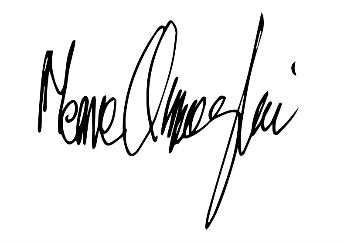
Meme Omogbai |
N. Elizabeth Schlatter |
CWA Picks: December
posted by CAA — Jan 05, 2022
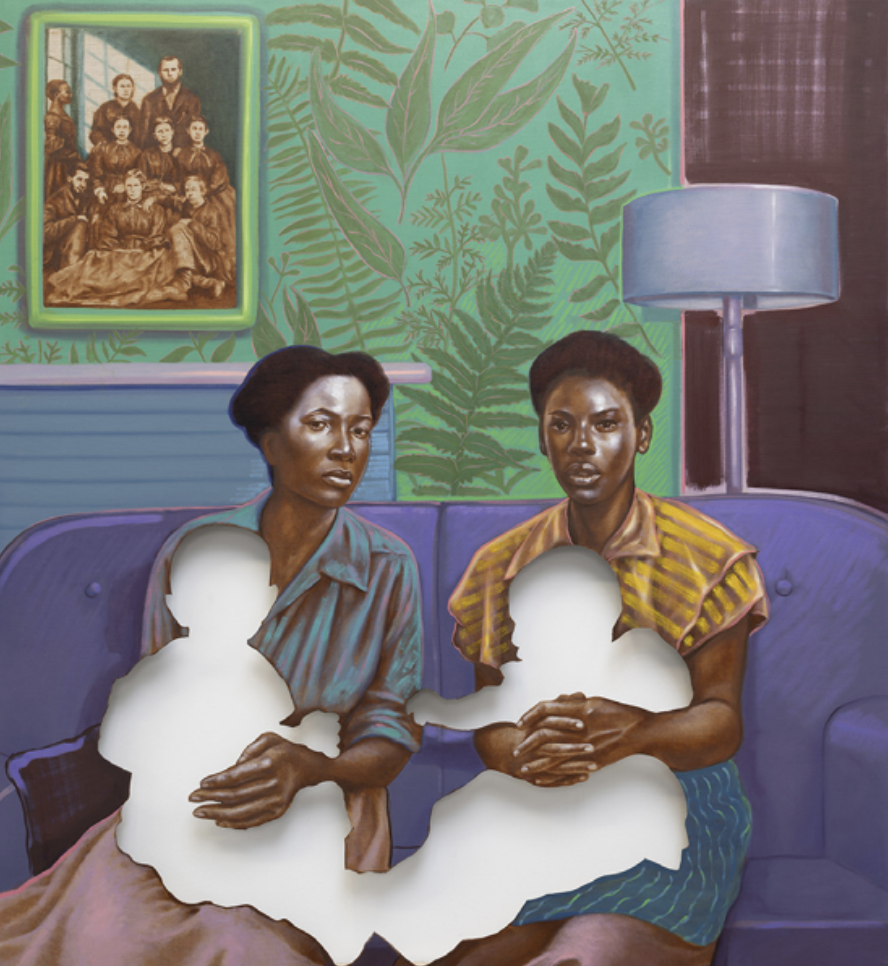
Not My Burden, 2019. Titus Kaphar (American, b. 1976). Oil on canvas; 167.6 x 153 cm. © Titus Kaphar. Image courtesy of the artist and Gagosian. Collection of Ellen Susman, Houston, Texas. Photo: Rob McKeever
The December “Picks” of exhibitions and opportunities from CAA’s Committee on Women in the Arts focus on the notion of lineage both as a subject matter and as a framework in which the featured artists are in dialogue. The following artists look back as they look forward, exploring the ways in which memory and history are intertwined with our present.
BY HER HAND: ARTEMISIA GENTILESCHI AND WOMEN ARTISTS IN ITALY, 1500 – 1800
September 30, 2021 – January 9, 2022
The Wadsworth Atheneum Museum of Art
By Her Hand presents a diverse group of female artists working in Italy during the 17th century from the celebrated Artemisia Gentileschi to her lesser-known contemporaries. While female artists played an important role in the male-dominated art world of their time, their success and contributions have historically been overlooked.
Frida Kahlo: POSE
June 25, 2021 – January 2, 2022
Rose Art Museum
Frida Kahlo: POSE includes contemporary art from the Rose permanent collection alongside pieces by Kahlo marking her significant influence and legacy. The exhibit is organized into five sections: posing, composing, exposing, queering, and self-fashioning. Each segment presents the revolutionary work of an artist who explored identity on an incredibly intimate and vulnerable level.
Picturing Motherhood Now
October 16, 2021 – March 13, 2022
The Cleveland Museum of Art
Picturing Motherhood Now represents a varied and intergenerational story of motherhood. Many of the exhibiting artists connect the experience of motherhood with other social issues including class, the history and impact of slavery, gender, migration, and indigenous cultures. While much of the work was created in the past two decades, the exhibit also highlights artists from the mid-twentieth century.
Georgia O’Keeffe, Photographer
Through January 17, 2022
Museum of Fine Arts, Houston
Georgia O’Keeffe, Photographer, now on view at the Museum of Fine Arts, Houston shares the previously unexplored photographic work of this iconic artist. About one-hundred photographs are included, alongside many of her paintings and drawings, and providing a rich survey of her artistic practice.
Josephine Halvorson
October 1, 2021 – March 28, 2022
Exhibition featuring the Georgia O’Keeffe Museum’s first Artist-in-Residence
Josephine Halvorson, a painter from Massachusetts, was the first Georgia O’Keeffe Museum’s Artist-in-Residence in 2019. Halvorson is currently exhibiting work she created in response to the landscape surrounding O’Keeffe’s homes as well as the personal collections that filled those homes at Ghost Ranch and in Abiquiú, New Mexico, and at the Museum in Santa Fe. This exhibition will be on view in Gallery 3 from October 1, 2021 to March 28, 2022.
Barbara Deming Memorial Fund
The application period is January 1 – 31, 2022 for Visual Art, Fiction, and Mixed Genre.
Money for Women is the oldest ongoing feminist granting program and disperses funds to feminist writers and visual artists on a yearly basis. In this grant cycle, the foundation is seeking applications from visual artists, fiction writers, and mixed genre creators.
Finalists for the 2022 Morey and Barr Awards
posted by CAA — Jan 03, 2022
CAA is pleased to announce the 2022 finalists for the Charles Rufus Morey Book Award and the two Alfred H. Barr Jr. Awards. The winners of the three prizes, along with the recipients of other Awards for Distinction, will be announced in January 2022 and presented during Convocation in conjunction with CAA’s 110th Annual Conference, February 16–19, 2022.
Charles Rufus Morey Book Award Shortlist, 2022
Monica Bravo, Greater American Camera: Making Modernism in Mexico, Yale University Press, 2021
Elina Gertsman, The Absent Image: Lacunae in Medieval Books, Penn State University Press, 2021
Alfred H. Barr Jr. Award Shortlist, 2022
Dorothy Moss, Hung Liu: Portraits of Promised Lands, Smithsonian National Portrait Gallery, 2021
Sarah Roberts and Katy Siegel, Joan Mitchell, Yale University Press, 2021
Alfred H. Barr Jr. Award for Smaller Museums, Libraries, Collections, and Exhibitions Shortlist, 2022
Julie L. McGee, David Driskell: Icons of Nature and History, Rizzoli, 2021
David S. Areford, Strict Beauty: Sol LeWitt Prints, Yale University Press, 2020
Meet the 2022 CAA-Getty International Program Participants
posted by CAA — Dec 22, 2021
We’re pleased to announce this year’s participants in the CAA-Getty International Program. Now in its eleventh year, this international program supported by the Getty Foundation will all twelve new participants and four alumni to participation in the 2022 Annual Conference. Learn more about the first ten years of the program in our online publication.
At a pre-conference colloquium, the new participants will discuss key issues in the international study of art history together with CAA-Getty alumni and US hosts. The program will delve into topics as postcolonial and Eurocentric legacies, interdisciplinary and transnational methodologies, and the intersection of politics and art history.
Alumni invited back to the 2022 conference will present in the session Can Art History Be Affective? Empathy, Emotion and the Art Historian, chaired by Getty alumni and International Committee members Nora Veszpremi and Cristian Nae, while also providing an intellectual and social link between new participants and our burgeoning group of CAA-Getty International Program alumni.
The goal of the CAA-Getty International Program is to increase international participation in CAA’s activities and the field of visual arts in academia, thereby expanding international networks and the exchange of ideas both during and after the conference. We look forward to welcoming the following participants.
2022 PARTICIPANTS IN THE CAA-GETTY INTERNATIONAL PROGRAM

Tatiana Muñoz Brenes is an art curator and researcher. She has combined the exercise of cultural management with Social Sciences by having degrees in Art History and Psychology, both from the University of Costa Rica. Her training has allowed her to work on the topics of community museums, sustainability, collection research, curating exhibitions and curatorial accompaniment for artistic production. Currently, her work focuses mainly on queer art and the LGBTIQ+ community in Latin America. In addition, she has extensive experience in international projects, lectures, publications and museum training in Scotland, Portugal, Spain, China, Japan, Ecuador, and other countries. Projects can be found at www.arthistorylady.com
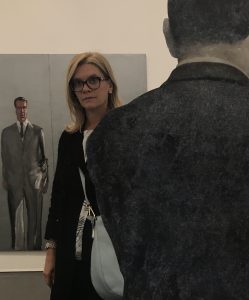
Simona Cupic is Professor at the Department of Art History, University of Belgrade, Serbia. Her fields of research and teaching include art and culture between the World Wars, and the 1950s and 1960s. She is particularly interested in the visual and popular culture between 1920s and 1960s. She is the author of Mona Lisa & Superman. John F. Kennedy and the New Frontier of the Culture (2016), Elain de Kooning. Portraits (with Brandon Brame Fortune, Ann Eden Gibson, 2015), The JFK Culture (edited volume, 2013), and Bourgeois Modernism and Popular Culture. Episodes of the Fashionable, Faddish and Modern (1918-1941) (2011), among others.
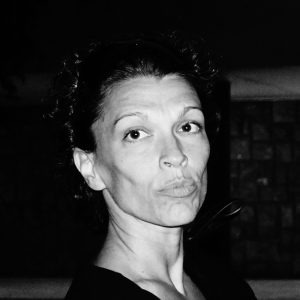
Anica Draganić is an architectural historian, conservator and multimedia artist who currently serves as an Associate Professor at the University of Novi Sad, Serbia. She received her PhD in Architectural History and Heritage Preservation from the University of Belgrade with a dissertation on Austro-Hungarian historical breweries. Her work focuses on nineteenth- and twentieth-century European architecture, with particular emphasis on industrial heritage and identity issues in the intercultural context of Central Europe. Her extensive research on the architectural heritage of the Vojvodina region has been published in journals, conference proceedings, and books, but also presented in numerous exhibitions. Her most recent book, Shadows and Silhouettes of Industrial Past of Vojvodina, shows the complexities of the socio-political context in which the industrial architecture of a specific multicultural region emerged, developed and disappeared. She is currently particularly interested in European architecture from the socialist period, exploring its historical values and contemporary potential.
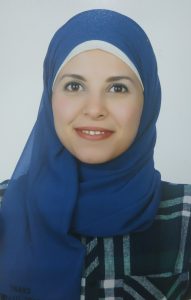
Heba Khairy Metwaly is an Exhibition coordinator at the Grand Egyptian Museum. She Oversees and provide rigorous, accurate and efficient exhibition coordination and follow up all aspects of exhibition development between all partners in the GEM. She is a PhD researcher specialized in the Collection Management and Documentation Practices in different museums. Heba has participated in many international and national field projects and studies focusing on the tangible and intangible material culture preservation and local community engagement and development. Heba has participated in the development of the daily life gallery “P34” at the Egyptian Museum of Cairo, the European Union Funding Project of Transforming the Egyptian Museum. In 2017 she participated in the British Museum International Training Program, where she curated the Object in Focus temporary exhibition. She Also participated in many international conferences focusing on the preservation of museum collection and exhibition design.

Roma Madan Soni is an art historian with a PhD from the University of Wolverhampton, an Assistant professor at Box Hill College Kuwait, an ecofeminist-artist, and a researcher. Her art, teaching, and research are interdisciplinary, positioned at the node of ecofeminism: practice, theory and history, and contemporary visual politics. Her articles are published in Journal of Visual Art Practice, Feminist Media Studies, Ecofeminism and Climate Change, Crafts Research, Art & The Public Sphere, Necsus, International Feminist Journal of Politics, Journal of Gender Studies, Swasti, and a chapter in Cambridge Scholars. She collaborated for conference presentations and conducted workshops at CAA, SVIMS-Pune, JNU, LSR, Raza Foundation, University of Wolverhampton, Kuwait-Nuqat, KISR, TEDx Global Day- Gulf University of Science and Technology, Dar Al Athar-Yarmouk, Kuwait University, American University of Kuwait, Box Hill College Kuwait, American Open University, UN Habitat and Beit Sadu. She has exhibited at Kunsthaus-Steffisburg, TAPRI-Finland, DarAlAthar AlIslamiyah, The Scientific Centre Kuwait, MOMA-Kuwait, Masaha13, Artsy, Mayinart, Artling, Saatchi galleries, and painted the book-cover for Routledge Handbook of Feminist Peace Research (2021). Research grants, commissions and awards from The Scientific Centre Kuwait, Kuwait Foundation of Advanced Sciences, Kuwait Institute of Scientific Research, UN Habitat, and Arab Open University aided her research and creations. She is a member of the Museum Committee and a Reader for the Council of Readers at CAA. I chair the “Transformative Education Think Tank”-Collective Impact Coalition-Konrad Adenauer Stiftung to address Kuwait’s academic challenges. Her work has been accepted at the Venice Art Fair and Florence Biennale 2021.
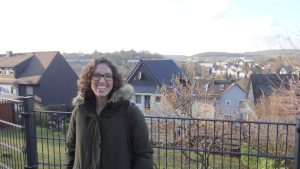
Patricia D. Meneses is an assistant professor of Art History at the University of Campinas (Brazil). She earned her PhD in History of the Visual Arts at the University of Pisa (2009). She is the author of Baccio Pontelli a Roma. L’attività dell’architetto per Giuliano Della Rovere (Felici Editore 2010) and editor of several books, such as Arte Não-Europeia. Conexões historiográficas a partir do Brasil (Esta ção Liberdade 2020), and A imagen como experimento. Debates contemporaneous sobre o olhar (Milfontes 2021). Recently, she was Hans Jonas visiting professor at the University of Siegen (2019), where she taught a course on “exotic” materials in Art History. She is currently part of a Connecting Art Histories project sponsored by the Getty Foundation (“Teaching Non-European at Brazilian Universities”). Her research focuses on the connections between art, science and ecology in the nineteenth-century. She is presently developing a book project about hummingbird’s ecology in Brazilian visual culture.
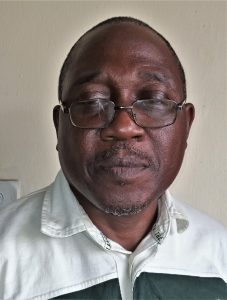
Akinwale Onipede is an art historian, researcher and teacher at the University of Lagos, Nigeria. He trained at the University of Benin, and, the University of Lagos, where he works in the area of the interface of global and local cultures and identities as expressed in visual arts. His main interest is in how developments globally in the philosophies, techniques, products and opportunities in visual arts, have affected its contemporary practice and direction in Nigeria. The universalization of cultures, consequent upon globalization, he argues, is skewed in favor of the West, whose culture is endorsed, whose pocket is deepest and whose machinery is most efficient, in the promotion of the direction of visual arts studies, practice, articulation and documentation. He is of the position that the continent that produced the great pyramids, the Nok, Igbo Ukwu, Ife and Benin masterpieces should play crucial roles in contemporary promotion of the arts.

Melissa M. Ramos Borges is an art historian with a predilection for the (re)vision of the discipline. She obtained her doctorate from the Programa de Estudios Artísticos, Literarios y Culturales with a specialty in Art History at the Universidad Autónoma of Madrid, where she presented the first comprehensive study of avant-garde art produced between 1960-1980 in Puerto Rico. She is a professor of Art History and Theory at the University of Puerto Rico, Mayagüez and Río Piedras Campus. In addition, she is an independent researcher and curator who has published and presented her exhibitions and articles in various international platforms. She curated SUZI FERRER, the first retrospective exhibition of the groundbreaking feminist avant-garde artist, presently on view at the Museo de Arte y Diseño de Miramar. She is currently working on publishing a catalogue with contributions from various scholars which will accompany an upcoming traveling SUZI FERRER exhibition.

Shenouda Rizkalla is a trained archaeologist with extensive experience in archaeological fieldwork, database and collections management, and community outreach. His current research focus is the museum’s role in preserving the local community identity, applied to the content and display of the Sharm El-Sheikh museum and build up a sustainable community outreach program by engaging the local population with the collection and relate the results to wider discussions of repatriation and post-colonial heritage management in Egypt. Rizkalla is an Egyptology PhD graduate from Helwan University-Egypt. His research to date has been diverse, working on recording and translating Ptolemaic Period hieroglyphics, creating and executing site management strategies, and addressing the looting of archaeological sites. He is a member of many excavations and site management missions inside Egypt since 2012. He has many Presentations and Invited Talks, Academic Reports and Publications.
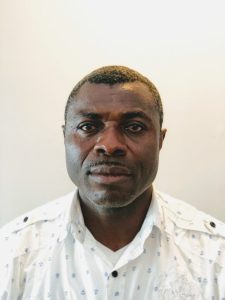
Nsima Stanislaus Udo is a Nigerian and an Africanist scholar. He completed his BA in History and International Relations in Ile-Ife, Nigeria. He then proceeded to South Africa where he completed his Honors and MA degrees (cum laude) at the University the Western Cape in Visual History and Theory. He lives in Cape Town and is a doctoral candidate at the University of the Western Cape. His research interest is in African cultural studies: in thinking around visual representations, histories and meanings of African cultural and festival practices. His doctoral research is currently looking at the history of Calabar Festival and Carnival, Nigeria. He is exploring the multiple-layered cultural, visual, aesthetic, economic and secular representations of this complex and elaborate festival. Nsima Stanislaus Udo presently serves as a teaching and research assistant at the Faculty of Art in the same university.
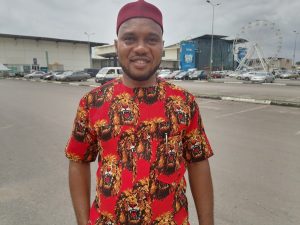
John Kelechi Ugwuanyi is a senior lecturer and the coordinator of postgraduate studies in the Department of Archaeology and Tourism, University of Nigeria, Nsukka. He had his PhD in heritage studies at the University of York and MA and BA in Archaeology and Tourism at the University of Nigeria. His research interest is critical heritage studies, museum, indigenous knowledge systems, tourism, and contemporary archaeology. He is the co-editor of Journal of African Cultural Heritage Studies and sits on the editorial board of the Studies in Contemporary and Historical Archaeology in Theory book series published by the Archaeopress in Oxford as part of the British Archaeological Report series of monograph. Kelechi has published in national and international journals of repute. He is a fellow of the American Council of Learned Societies and a recipient of other scholarship/grant including the Overseas Research Scholarship of the University of York, UK.
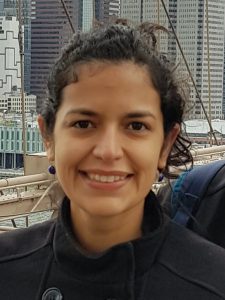
Elizabeth Catoia Varela holds a PhD in History and Criticism of Art from the Federal University of Rio de Janeiro, Brazil (2016). She worked at the Research and Documentation Center of the Modern Art Museum of Rio de Janeiro – MAM Rio (2009-2021). Her dissertation was published as a book in 2017 (Concrete Art Beyond Europe: Brazil, Argentina and the MAM Rio). She published other three books about the history of the museum. Varela was the curator of the exhibition “MAM: its history, its heritage” (2013-2016). She was awarded in 2020 with the AAM-Getty International Program/American Alliance of Museums and is a member of the College Art Association (CAA) and the International Council of Museums (ICOM).
PARTICIPATING ALUMNI

Nadhra Shahbaz Khan is Associate Professor of Art History and the Director of the Gurmani Centre for Languages & Literature at LUMS, Lahore, Pakistan. A specialist in the history of art and architecture of the Punjab from the sixteenth to the early twentieth century, Dr. Khan’s research covers the visual and material culture of the region during the Mughal, Sikh, and colonial periods. Her interest lies in investigating levels of human agency behind artefacts and architectural spaces, both as creators and consumers to understand their political, religious and socio-economic ambitions at different historical intersections. Her publications, conference papers and other research activities spread over more than a decade, especially her book titled Maharaja Ranjit Singh’s Samādhi in Lahore: A Summation of Sikh Architectural and Decorative Practices has successfully brought Sikh art and architecture to the forefront of Pakistan’s heritage discussions and conservation activities.
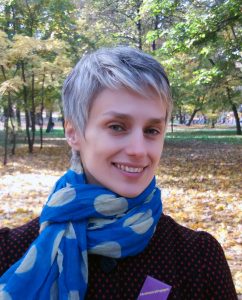
Halyna Kohut is an associate professor in the Faculty of Culture and Arts at the Ivan Franko National University of Lviv, Ukraine, where she teaches history of art, contemporary art, feminist art, and history of theatrical costume. Educated as an artist, she received her Ph.D. from the Lviv National Academy of Arts. Kohut is the CAA-Getty International Program alumna and a recipient of scholarships and grants from the Samuel H. Kress Foundation, Austrian Agency for International Mobility and Cooperation, the Canadian Institute of Ukrainian Studies at the University of Alberta, and the Queen Jadwiga Foundation at the Jagiellonian University in Cracow. Kohut specializes in eighteenth-century East European carpets and kilims. Her most recent research interest focus on woman art in Soviet Ukraine. She is especially interested in how ideology informed the identities of women artists and how they challenged that ideology with their art practices.
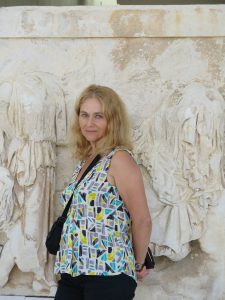
Irena Kossowska graduated from the Warsaw University in 1980. She obtained a Ph.D. degree and Habilitation at the Institute of Art of the Polish Academy of Sciences, in 1990 and 2001 respectively. Currently she is Full Professor of Art History at the Nicolaus Copernicus University in Torun, and at the Polish Institute of World Art Studies in Warsaw. She specializes in the field of nineteenth- and twentieth-century visual arts, art theory, and criticism. She is the recipient of numerous awards and fellowships, including from the Bogliasco Foundation, Center for Advanced Study in the Visual Arts, Smithsonian Institution, Zentralinstitut für Kunstgeschichte, National Humanities Center, Institut national d’histoire de l’art, Henry Moore Institute, and the British Academy. She has written extensively on Polish and European art, including Artistic Reconquest: Art in Interwar Poland and Europe, The Search for Cultural Identity in Eastern and Central Europe 1919-2014, Symbolism and Young Poland; Reinterpreting the Past: Traditionalist Artistic Trends in Central and Eastern Europe of the 1920s and 1930s; and The Beginnings of Polish Original Printmaking 1897-1917.
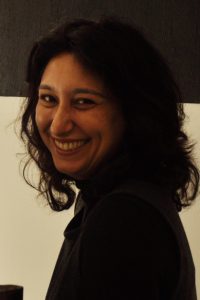
Ana Mannarino is an art historian and a professor of art history in the School of Fine Arts and the Visual Arts Postgraduate Program at the Federal University of Rio de Janeiro, where she received her PhD in history of arts and visual arts. Her research focuses on Brazilian modern and contemporary art, particularly on the relationship between text and image, art and poetry, and the production of artists’ books.
Judith Brodsky, Mary Garrard, and Ferris Olin, Co-authors of Chapter 11, “Governance and Diversity”
posted by CAA — Dec 17, 2021
As part of CAA’s 10-year anniversary celebration of its publication, The Eye, the Hand, the Mind: 100 Years of the College Art Association, chapter authors reflect on their contributions and how their impressions of the field have changed. Our final video in the series features Judith Brodsky, Mary Garrard, and Ferris Olin, who co-authored chapter 11, “Governance and Diversity.”
Involved not just in CAA, its Annual Conference, and its Committee on Women in the Arts (CWA), but also with CAA’s affiliate society the Women’s Caucus for Art, these three women represent pillars in the field of feminist art history.
In this video, they discuss the first 100 years of CAA’s history representing women and underrepresented groups, and point to the future: 2022 marks fifty years of the first committee to represent women at CAA. CAA is excited to honor this milestone at the 2022 Annual Conference and beyond.
Brodsky and Olin are each presenting at the upcoming 110th Annual Conference. See links underneath their bios below for more information on their sessions, panels, and talks.
SPEAKERS BIOGRAPHIES
Judith K. Brodsky is currently distinguished professor emerita at Rutgers University. She founded the Rutgers Center for Innovative Print and Paper, now renamed the Brodsky Center in her honor and located at the Pennsylvania Academy of Fine Arts. The Center has been instrumental in promoting the recognition of women artists and artists of color. She is also co-founder of the Rutgers Center for Women in the Arts and Humanities and The Feminist Art Project, a national and international program to promote women artists in the cultural milieu. With her colleague, Dr. Ferris Olin, she established the Miriam Schapiro Archives on Women Artists at Rutgers and was curator of the Mary H. Dana Women Artists Series at Rutgers from 2006-2013. Brodsky was the co-founder of the Women Artists Archive National Directory (WAAND), funded initially by the Getty Foundation, a digital directory of archives where the papers of women artists active in the US since 1945 are located. A printmaker and book artist, Judith’s work is in over 100 permanent collections. She has also organized and curated many exhibitions and has published extensively, including contributions to The Power of Feminist Art and SIGNS, A Journal of Women in Culture and Society; Junctures in Women’s Leadership: The Arts. Most recently she published the first book on the impact of feminist theory on digital technology in the arts titled Dismantling the Patriarchy, Bit by Bit: Feminism, Art, and Technology, Bloomsbury, 2021. She served as CAA’s President and received the Annual Recognition Award from CAA’s Committee on Women in the Arts, as well as past national president for ArtTable and Women’s Caucus for Art.
Details for Judith Brodsky’s participation in the 2022 Annual Conference: link.
Mary D. Garrard, professor emerita of art history at American University, Washington, D. C., is a scholar whose work has combined Italian Renaissance art with feminist studies. Her book, Artemisia Gentileschi: The Image of the Female Hero in Italian Baroque Art (Princeton, 1989), was a groundbreaking contribution to the field, that launched modern studies of the now-famous artist. In Artemisia Gentileschi Circa 1622: The Shaping and Reshaping of an Artistic Identity (University of California, 2001), Garrard addressed new critical issues in Gentileschi studies. Her third book, Artemisia Gentileschi and Early Modern Feminism, positions the artist among the feminist treatises and debates of her time (Reaktion Books, London, 2020). Beyond Artemisia, Garrard has written and spoken extensively on Italian Renaissance, Early Modern art, and feminist art history. With her colleague Norma Broude, Garrard created and edited three books that have become basic texts in art history and women’s studies courses, including Feminism and Art History: Questioning the Litany (1982); The Expanding Discourse: Feminism and Art History (1992); and Reclaiming Female Agency: Feminist Art History After Postmodernism (2005). Broude and Garrard also created and contributed to The Power of Feminist Art: The American Movement of the 1970s (1994).
Ferris Olin is distinguished professor emerita at Rutgers University, where she was the co-founder and co-director (with Judith K. Brodsky) of Rutgers Center for Women in the Arts and Humanities, and The Feminist Art Project, an international collaboration to make visible the impact of women on the cultural landscape. She also established the Miriam Schapiro Archives on Women Artists at Rutgers as well as the Margery Somers Foster Center, a research center focused on documenting women’s leadership in the public arena, and served as Associate Director of the Institute for Research on Women and earlier, Director of the Art Library. She was curator of the Mary H. Dana Women Artists Series at Rutgers from 1995-2006 and later (with Judith K. Brodsky) from 2006-2013. With Brodsky, Olin also created the Women Artists Archive National Directory (WAAND). Olin has also published broadly. Her most recent book, co-authored with Judith K. Brodsky, is called Junctures in Women’s Leadership: The Arts (Rutgers University Press, fall 2018). Olin has served on the boards of numerous non-profit organizations and was Vice-President of the College Art Association. She is the recipient of numerous awards, among them the Women’s Caucus for Art Lifetime Achievement Award and the College Art Association Committee on Women’s Annual Recognition Award (now known as Distinguished Feminist Award).
Details for Ferris Olin’s participation in the 2022 Annual Conference: link.
Millard Meiss Publication Fund Grantees Fall 2021
posted by CAA — Dec 17, 2021
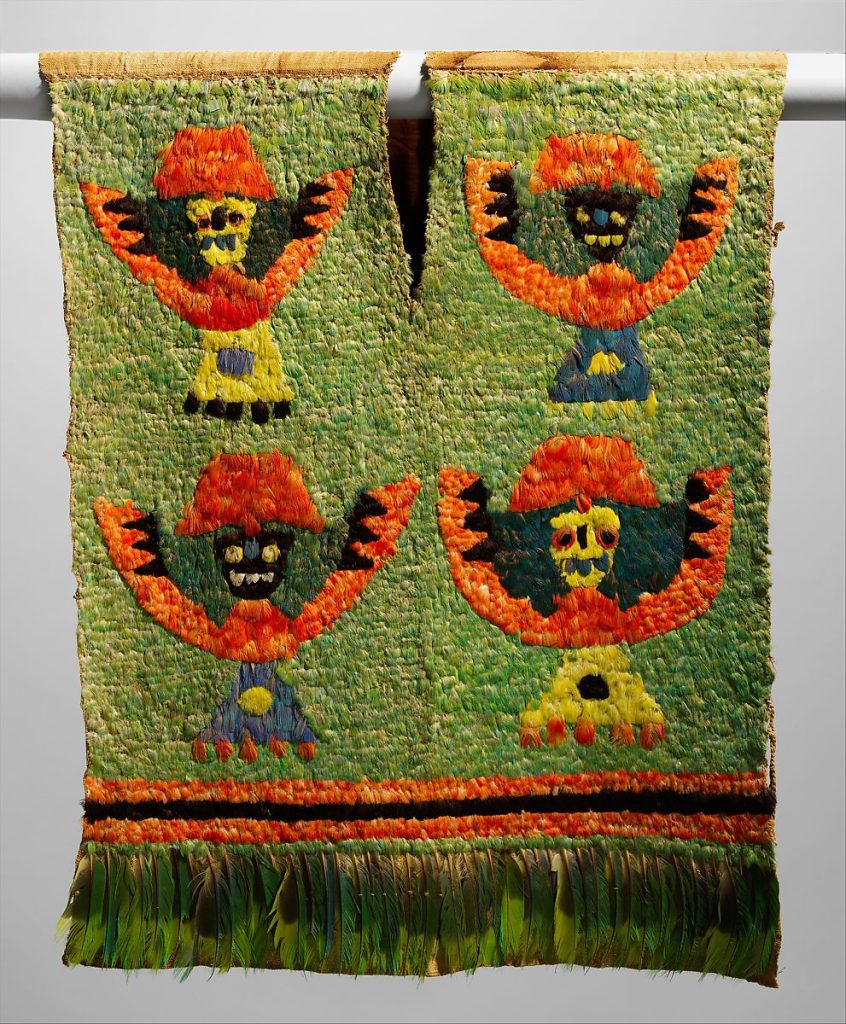
Feathered Tabard, 15th–16th century Peru, Chimú, cotton and feathers, Dimensions: H. 30 × W. 25 in. (76.2 × 63.5 cm), Fletcher Fund, 1959, The Metropolitan Museum of Art
MEET THE GRANTEES
Twice a year, CAA awards grants through the Millard Meiss Publication Fund to support book-length scholarly manuscripts in the history of art, visual studies, and related subjects that have been accepted by a publisher on their merits, but cannot be published in the most desirable form without a subsidy.
Thanks to the generous bequest of the late Prof. Millard Meiss, CAA began awarding these publishing grants in 1975.
The Millard Meiss Publication Fund grantees for Fall 2021 are:
Monica Amor, Gego: Weaving the Space In-Between. Art, Architecture, Design, and Craft at the Edge of Modernity, Yale University Press
Sampada Aranke, Death’s Futurity: The Visual Life of Black Power, Duke University Press
Shulamith Behr, Women Artists in Expressionism: From Empire to Emancipation, Princeton University Press
Suzaan Boettger, The Passions of Robert Smithson, University of Minnesota Press
Claudia Brittenham, Unseen Art: Memory, Vision, and Power in Ancient Mesoamerica, University of Texas Press
Kai jun Chen, China Made: Technocratic Culture in the Qing Imperial Porcelain Industry, 1680–1750, University of Washington Press
Stephanie Porras, The First Viral Images: Maerten de Vos, Antwerp Print, and the Early Modern Globe, Penn State University Press
Frederic Schwartz, The Culture of the Case: Madness, Crime, and Justice in Modern German Art, The MIT Press
Briana Smith, Free Berlin: Art, Urban Politics, and Everyday Life, The MIT Press
Karin Zitzewitz, Infrastructure and Form: The Global Networks of Indian Contemporary Art, 1991–2008, University of California Press
View a list of all recipients of the Millard Meiss Publication Fund from 1975 to the present. The list is alphabetized by author’s last name and includes book titles and publishers.
BACKGROUND
Books eligible for a Meiss grant must currently be under contract with a publisher and be on a subject in the arts or art history. The deadlines for the receipt of applications are March 15 and September 15 of each year. Please review the Application Guidelines and the Application Process, Schedule, and Checklist for complete instructions.
CONTACT
Questions? Please contact Cali Buckley, Content Manager for Education and Intellectual Property, at cbuckley@collegeart.org.
Affiliated Society News: December
posted by CAA — Dec 17, 2021
Many of CAA’s affiliated societies will be presenting sessions at our 110th Annual Conference from February 17-19 and from March 3-5. Check out a list of their sessions to preview!
To attend these sessions and more, make sure to register for the conference and learn more at its registration page.
BIBLIOGRAPHICAL SOCIETY OF AMERICA
Announcements
Bibliography Week 2022 Schedule & Registration
From January 25–28, 2022 the Bibliographical Society of America will celebrate Bibliography Week with a series of events designed to demonstrate bibliographical practice and its relevance to interdisciplinary scholarship in the humanities.
Tuesday, January 25, 4-5pm Eastern – Materialities of Tibetan Buddhist Texts
Within the diverse traditions of Tibetan Buddhism, the power of books—both printed and hand-written—lies not only in their contents, but also in their materiality as objects. The three scholars on this panel will share bibliographical studies of Tibetan texts that highlight how text production, circulation, and replication within architectural spaces has been utilized by Tibetan religious and political leaders to assert and solidify their power.
Wednesday, January 26, 4-5pm Eastern – Meet the Editors of Papers of the Bibliographical Society of America
Please join Papers of the Bibliographical Society of America (PBSA) co-editors Dr. Sarah Werner and Dr. Jesse Erickson for an online Q&A session on January 26. Drs. Werner and Erickson will discuss their vision for the journal and how it can be part of an expanded field of bibliographical scholarship. They will also answer questions that you might have about publishing in PBSA, such as the submission and review process, image permissions, special issues, and open access.
Thursday, January 27, 11-12pm Eastern – In-Person, Center for Book Arts Tour
Guests are invited to a tour of the Center for Books Arts in New York (28 W 27th St., 3rd Floor). For nearly 50 years, CBA has supported artists and uplifted the book arts by presenting exhibitions, lectures, readings, and performances; providing opportunities for artists, writers, curators and scholars through residencies, fellowships, publishing, and collecting; and empowering the creation of new book art by providing courses on book art related technique and history.
Thursday, January 27, 2-3pm Eastern – Bound Images: Maps and Books
This panel offers three case studies to explore what changes theoretically and in practice when we dethrone the ‘sovereign map’ and engage with the production, circulation and reading of maps as bound images, a hybrid graphic and textual part of the stories told by authors and publishers which is experienced by readers through materiality, context, and significance: Giuseppe Rosaccio’s Il mondo e sue parti (Florence, 1595), Johann Jakob Scheuchzer’s Physica Sacra (Augsburg and Ulm, 1731), and Jorge Juan and Antonio Ulloa’s Relación Histórica del viage a la América meridional (Madrid, 1748).
Friday, January 28, 12:00 pm Eastern – 2022 BSA Annual Meeting & New Scholars Program
- Christopher Adams, Malkin New Scholar – ‘Could you make it rather more of a He and She picture?’: The Queer Dust-Jacket and Postwar British Fiction
- Eve Houghton, Pantzer New Scholar – ‘I am always sorry to antagonize collectors’: Henrietta Bartlett and the 1916 Census of Shakespeare Quartos
- Liza Mardoyan, BSA New Scholar – Decorative Bird Initials in the Medieval Armenian Manuscript Culture
- Learn more about the 2022 New Scholars and read their talk abstracts here.
Friday, January 28, 1:30 pm Eastern – Keynote Lecture by Dr. Elizaveta Strakhov: What Makes Bibliography Critical? A Medievalist’s Response
What makes bibliography critical for a Western manuscripts scholar? Medievalists have, after all, enshrined bibliography to the point of developing the specialized subdisciplines of paleography and codicology. How does a Western medievalist breathe new life into bibliography, that bread-and-butter of their scholarly pursuits? This talk offers a case study of two manuscripts of bilingual Anglo-French poet Charles d’Orléans’s work: not the two collections notoriously supervised by him, but two later fifteenth-century, largely neglected manuscripts of his work, one made for European humanist circles and the other circulating with English Tudor royal audiences.
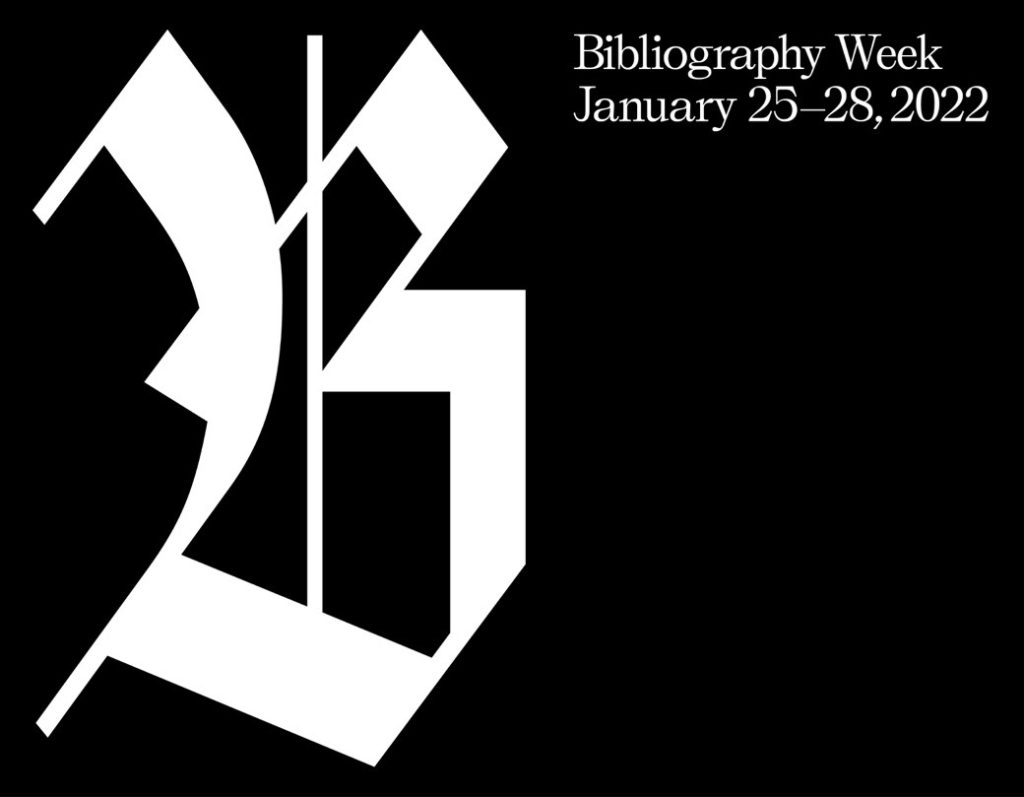
AHNCA (Association of Historians of Nineteenth-Century Art)
Events
Virtual Salon Series: Rethinking the Visual and Material Culture of Enslavement
January 19, 2022 at 7 pm EST
The Association of Historians of Nineteenth-Century Art and the Dahesh Museum of Art present a Virtual Salon, “Rethinking the Visual and Material Culture of Enslavement,” featuring Jennifer Van Horn (University of Delaware), Adrienne L. Childs (The Phillips Collection), and Phillip Troutman (George Washington University). Register at this link.
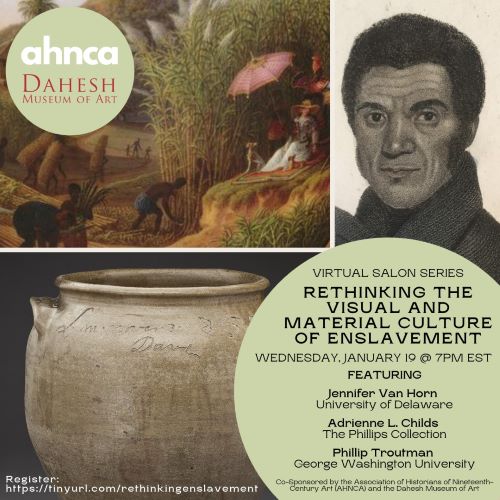
Virtual Salon: Decorative Arts and Materiality
February 9, 2022 at 7 pm EST
Please join us on Wednesday, February 9, at 7 pm EST for our Virtual Salon on the Decorative Arts and Materiality. This series of online events is co-sponsored by the Association of Historians of Nineteenth-Century Art (AHNCA) and the Dahesh Museum of Art. The panel will feature Amy F. Ogata (University of Southern California), Lee Talbot (The Textile Museum, George Washington University), and Christine Garnier (Center for Advanced Study in the Visual Arts/Harvard University). Registration information forthcoming!
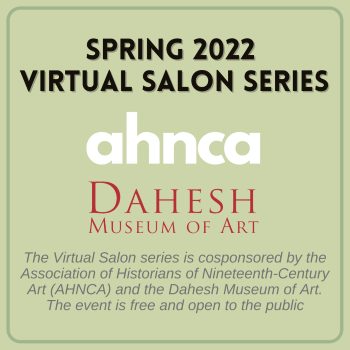
SOCIETY FOR THE HISTORY OF COLLECTING
Event
As part of its continuing series of Zoom lectures focusing on the collections of university museums, the next Society for the History of Collecting–West Coast chapter event will take place on January 28, 2022:
Collectors’ Clothing Caches: Selections from the Texas Fashion Collection
Annette Becker
28 January 2022, 10:00 AM, PST; 6 PM BST
This talk traces the history of the Texas Fashion Collection through three collections and collectors who have shaped its holdings. The Collection was originally conceived by Stanley and Edward Marcus, of the Neiman Marcus luxury department stores, who in 1938 created the Neiman Marcus award to recognize national and international talent in all areas of fashion and design. The talk then focuses on Claudia Heard de Osborne, whose passion for Balenciaga resulted in a gift of hundreds of garments by the designer. The final spotlight will be on brothers Scott and Stuart Gentling, visual artists who collected historic garments as part of their artistic practice.
Annette Becker is a material culture historian and arts educator committed to bridging popular and academic understandings of fashion history. She currently serves as the director and curator of the Texas Fashion Collection, an archive of nearly 20,000 garments and accessories housed at the University of North Texas.
To register for this event please email: events@societyhistorycollecting.org
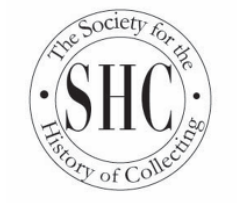
CAA’s 110th Annual Conference Museum-Related Sessions
posted by CAA — Dec 14, 2021
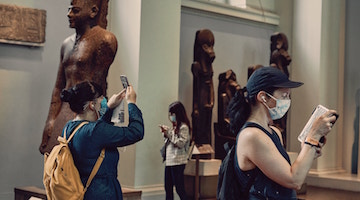
See below for information on CAA’s virtual Resources for Academic Art Museum Professionals (RAAMP) session and a list of other sessions with museum topics, organized by the two conference components, the first from February 17-19 and the second March 3-5.
Note: As of January 7, all in-person sessions and activities scheduled for February 16-19 in Chicago are now virtual on the same dates. Virtual sessions and activities scheduled for March 3-5 will remain the same. This change will allow for more access and engagement, regardless of location.
CAA’s RAAMP Session and Talks
New and Improved: Using Recent Experiences to Inform the Future of Museums
Thursday, March 3, 2022, 11:00 AM – 12:30 PM CST (12:00 PM – 1:30 PM EST)
Walking the Talk: New Low Carbon Curatorial and Educational Structures that Amplify Impact and Reduce Costs
Natalie Marsh, ViVA Virtual Visiting Artists
Amanda Potter, Zimmerli Art Museum at Rutgers University
Jennifer Reynolds-Kaye, ViVA Virtual Visiting Artists
Lessons Learned from a Year of Virtual Teaching
Ellen M. Alvord and Kendra Weisbin
Speculative Annotation at the Library of Congress: A Web-Based Annotation Tool that Invites Virtual Engagement with the Library’s Collection
Courtney Lynn McClellan and Jaime Mears, Library of Congress
Museum Sessions, February 17-19
Canonizing the Intangible: Aromatic Strategies in the Making of the U.A.E.’s National Identity
Friday, February 18, 2022, 9:00 AM – 10:30 AM CST
Francesca Bacci, Zayed University
Economies of Discipline and Display: Curating Conflict in Israel/Palestine
Friday, February 18, 2022, 9:00 AM – 10:30 AM CST
Michelle Facos, Indiana University
Instrumentalizing Memory and the Politics of Commemoration
Friday, February 18, 2022, 9:00 AM – 10:30 AM CST
Iro Katsaridou, Museum of Byzantine Culture, Thessaloniki, Greece
Eve Kalyva, University of Kent
Reassessing the Art Biennial
Friday, February 18, 2022, 11:00 AM – 12:30 PM CST
Paloma Checa-Gismero, Swarthmore College
Recent Perspectives in the Philosophy of Curatorial Practice
Friday, February 18, 2022, 11:00 AM – 12:30 PM CST
Rossen Ventzislavov
The Mary H. Dana Women Artists Series at Rutgers University’s Douglass College: A 50 Year History of Exhibition and Space Making for Woman-Identifying Artists through the Voices of the Artists Themselves
Friday, February 18, 2022. 2:30 PM – 4:00 PM CST
Julia E. Marsh, Cedar Crest College
The Practice of Care: Trauma Informed Pedagogy
Education Committee
Saturday, February 19, 2022, 11:00 AM – 12:30 PM CST
Jenna Ann Altomonte, Mississippi State University
TFAP Feminist Solidarities and Kinships, Panel 3 – Exhibitions and Curatorial Spaces
The Feminist Art Project (TFAP)
Saturday, February 19, 2022, 12:30 PM – 2:00 PM CST
Erina Duganne, Texas State University
Susan E. Richmond, Georgia State University – School of Art and Design
Tatiana E. Flores, Rutgers University
New Frontiers: Creating, Collecting, Preserving and Displaying Digital Based Art of Russia and Eastern Europe
Saturday, February 19, 2022, 4:30 PM – 6:00 PM CST
Natalia Kolodzei. Kolodzei Art Foundation
Museum Sessions, March 3-5
Curatorial Care: Feminist and Queer Practices
Friday, March 4, 2022, 9:00 AM – 10:30 AM CST (10:00 AM – 11:30 AM EST)
Nomusa Makhubu, University of Cape Town
The Global Rise of Traveling Exhibitions at Mid-Century
Friday, March 4, 2022, 9:00 AM – 10:30 AM CST (10:00 AM – 11:30 AM EST)
Agata Justyna Pietrasik
Magdalena Moskalewicz, School of the Art Institute of Chicago
Activist Exhibitions
Friday, March 4, 2022, 4:30 PM – 6:00 PM CST (5:30 PM – 7:00 PM EST)
Rebecca J. DeRoo, Rochester Institute of Technology
New Age of Teaching the Art of the Islamic World
Museum Committee
Saturday, March 5, 2022, 9:00 AM – 10:30 AM CST (10:00 AM – 11:30 AM EST)
Xenia Gazi, School of the Art Institute of Chicago
Reconsidering Art History Through Access
Saturday, March 5, 2022, 9:00 AM – 10:30 AM CST (10:00 AM – 11:30 AM EST)
Sara Catherine Woodbury, College of William and Mary
Curating Craft: Contemporary Making in Global Museums of Islamic Art
Saturday, March 5, 2022, 11:00 AM – 12:30 PM CST (12:00 PM – 1:30 PM EST)
Leslee Michelsen, Doris Duke Foundation for Islamic Art at Shangri La
New Perspectives in Art, Design, and Art History: Supporting and Showcasing Emerging Voices from Marginalized Communities
Committee on Diversity Practices
Saturday, March 5, 2022, 2:30 PM – 4:00 PM CST (3:30 PM – 5:00 PM EST)
Stefanie Snider, Kendall College of Art and Design
Rachel Lynn de Cuba, Clemson University
In Memoriam: Robert Farris Thompson
posted by CAA — Dec 10, 2021

Robert Farris Thompson, an eminent art historian recognized for his field-leading research and writing on the art, history, culture, dance, and music of Africa and the Afro-Atlantic world, and who was the longest serving head of college in Yale’s history, died on Nov. 29. He was 88.
Thompson was professor emeritus of African American studies and the former Colonel John Trumbull Professor of the History of Art at Yale. For more than a half-century on Yale’s faculty, and during his 32 years as “Master T” at the helm of Timothy Dwight College, he secured his place in the pantheon of beloved professors and university leaders.
In recognizing Thompson with its inaugural Distinguished Lifetime Achievement Award for Writing on Art in 2003, the College Art Association described him as a “towering figure in the history of art, whose voice for diversity and cultural openness has made him a public intellectual of resounding importance.” In May 2021 he was honored with an honorary degree from Yale celebrating his lifetime of academic achievement.
Above excerpts and image from, “Robert Farris Thompson, pioneer in study of African and Afro-Atlantic art,” YaleNews (December 1, 2021). Please click this link to read the full article.
CAA 2021: A look back on the past year’s programming, publications, and opportunities
posted by CAA — Nov 30, 2021
CAA has produced this reel with a compilation of events, scholarship, programs, and initiatives CAA from the last year. See below for a full list of each item (in order of appearance in the video) with links to learn more.
Programming:
CAA’s first virtual Annual Conference
Mariam Ghani in conversation with Laura Anderson Barbata
In Conversation with Dr. Nancy Odegaard
Theresa Avila, Annual Conference Program Chair in conversation with Meme Omogbai
An Inaugural Evening with CAA Distinguished Awardees and Artists
CAA Then & Now: Reflections on the Centennial Book and the Next Century
Karen Leader, author of Chapter 12: Advocacy
Opportunities:
Publication, travel, and support grants
Publications and Publications Programming:
Artist Project, Elana Mann for Art Journal Open
Roundtable discussion for Art Journal Open, Holding Space…
Art Journal and The Art Bulletin
caa.reviews book and exhibition reviews
caa.reviews’s dissertation roster, 2020
Global Programs
CAA-Getty International Program
CAA-Getty 10-Year International Program online publication
Podcasts
CAA Conversations by CAA’s Education Committee
CAA’s 110th Annual Conference will take place in Chicago from February 17-19, followed by virtual live sessions to be held in Zoom from March 3-5. For more information and to register go to this link.



